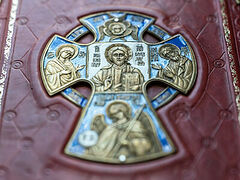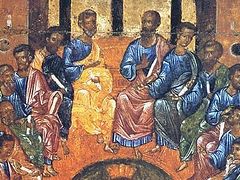In the name of the Father, and of the Son, and of the Holy Spirit!
Dear fathers, brothers and sisters! Today the whole Church is solemnly glorifying the Most Holy Trinity. This day is also called Pentecost. Why? Because this event happened on the fiftieth day after the Resurrection of the Lord and on the tenth day after the Ascension of our Lord Jesus Christ.
The events of Pentecost are described in the book of Acts of the Apostles, which was written by St. Luke the Evangelist. This is one of the twelve great feasts, but it is comparable in its significance to such feasts as the Nativity of Christ, the Nativity of the Most Holy Theotokos, and the Baptism of the Lord. It is a great feast, a great event.
What happened that day? The apostles together with the Most Holy Theotokos gathered in the upper room in Jerusalem in order to celebrate the Old Testament Pentecost. This festival was dedicated to the event when, on the fiftieth day after Moses led the Jews out of Egyptian captivity, he came with them to Mount Sinai and received the Decalogue—that is, the Ten Commandments. And it was this event that the apostles were marking together with the Most Holy Theotokos on the fiftieth day after the Old Testament Passover. But suddenly a strong wind and a great noise arose, and the Holy Spirit descended upon everybody present there in the form of tongues of fire. Some Holy Fathers suggest that the Holy Spirit descended in this way because the flame purifies you from sins, warms and initiates you. The apostles began to speak in different languages, as the Acts tells us. They started glorifying God and preaching Him.
We don’t know much about the gift of speaking in tongues (glossolalia). Some Holy Fathers say that the gift of speaking in tongues literally means speaking in different languages. Other Fathers of the Church suppose that this is an angelic language that is clear to everyone. And there is also a version that this is an antediluvian language that all mankind used to speak before the confusion of languages in Babel, when people in their pride and madness set about building the Tower of Babel in order to become like God. And the Lord confused their tongues.
 P. Brueghel. The Tower of Babel. 1563
P. Brueghel. The Tower of Babel. 1563
Hearing the noise, many Jews present at the celebration of the Old Testament Pentecost gathered around the upper room, where the apostles were preaching about the great works of God. And some of them were perplexed: “How can this be? Aren’t all the apostles Galileans? And why can each of us hear his own dialect? These are ordinary men, but they are speaking in such a way that we understand them!” Some began to say mockingly that the apostles must have drunk sweet wine. But the Apostle Peter denied this, saying that it was the third hour in the afternoon in Jewish time, which is according to our calculation nine in the morning. So they hadn’t eaten or drunk much yet.
And, raising his voice among the other apostles, St. Peter began to preach Jesus Christ as the Messiah. He said to the Jews that they had crucified the Messiah, the Savior of the world Whom the Lord had sent down to mankind. And when St. Peter’s words reached the very depths of the hearts of the Jews, they were horrified, because they had been co- partakers of the Crucifixion of the Redeemer of the world, and they had shouted to Pilate in their madness, “Crucify Him, crucify Him!” They had also shouted that His blood would be on them and on their children.
Seized with horror, the Jews asked the apostles: “Fathers, brothers! What should we do? How can we make amends for what we’ve committed?” And St. Peter replied, “Get baptized and embrace the faith in Jesus Christ.” And on the same day, about 3000 people were baptized.
The Day of the Holy Trinity, the feast of Pentecost, is called the birthday of the Church. It was from that moment, after the Descent of the Holy Spirit upon the apostles, that they grasped everything the Lord had told them, and everything He had taught them. And now, encouraged by the Holy Spirit, they were ready to go and preach. They were no longer afraid of anything, for the Lord Himself was with them, and the Truth was with them.
Every day the Church experienced significant growth, and more and more new members joined it. At first the apostles taught among the Jews, and then their preaching spread to the gentiles, to other peoples. What is the kontakion of today’s feast about?
“When the Most High came down and confused tongues, He divided the nations. But when He distributed the tongues of fire He called all to unity. Wherefore, with one mind we glorify the All-Holy Spirit.”
The kontakion speaks of two actions of the Holy Spirit. When the people madly building the Tower of Babel, the Lord confused the tongues to bring people to reason, confusing their single language so that they would cease to understand each other and stop—at least for a minute—what they were doing. And now the Lord, by distributing tongues of fire, is calling for unity of all in His Church, where the wondrous Divine gifts are kept as in a receptacle—primarily of course, these are the Sacraments and the teachings of our Lord.
Interestingly, in Church Slavonic the word “yazyk”, in addition to meaning “tongue” and “speech”, also means “people”, or “nation”; so the Lord calls for unity of not just some single, God-chosen people, but of all nations who will believe in Him.
On the feast of Pentecost, churches are supposed to be decorated with foliage, trees, and grass, and priests serve in green vestments. Where did this tradition come from? Because in the Holy Scriptures and in the teachings of the Church, green means life. The Holy Trinity is called the “Life-Giving Trinity”. The Holy Spirit gives life, and without Him genuine life is impossible. In the Holy Scriptures, life means a flowering tree, which is why today, while we are in church, we can see plants, grass, and green vestments on the clergy. And some parishioners, too, try to wear a piece of green clothing in memory of the life that the Lord grants to believers in Him.
Each one of us experienced an individual Pentecost as well. After Baptism, the apostles laid their hands on the newly baptized, and the Holy Spirit descended upon them, bestowing the gifts of the Holy Spirit. Gradually, the sacrament of laying on of hands after Baptism became the rite of Chrismation, as there were many members of the Church, but there were not enough apostles for everyone. Each of us present here has had this sacrament—some in infancy, others in adolescence, and others in adulthood. Know, that this was your individual Pentecost—at that moment the Holy Spirit descended upon you, bestowing His gifts on you. And it depends on each one of us whether we will grow this seed that has been sown in our hearts, whether we will cultivate the land properly, whether we will make it fruitful through tears of repentance, faith and works; for the Apostle James teaches us that Faith without works is dead (Jm. 2:26). It depends on our efforts, our desire and self-restraint, whether we become true disciples and followers of Our Heavenly Teacher or not. Therefore, let us ask the Lord to help us, so that through the prayers of the Most Holy Theotokos and the apostles we may—at least partially—come closer to the grace they received on the day of Pentecost. Amen.





